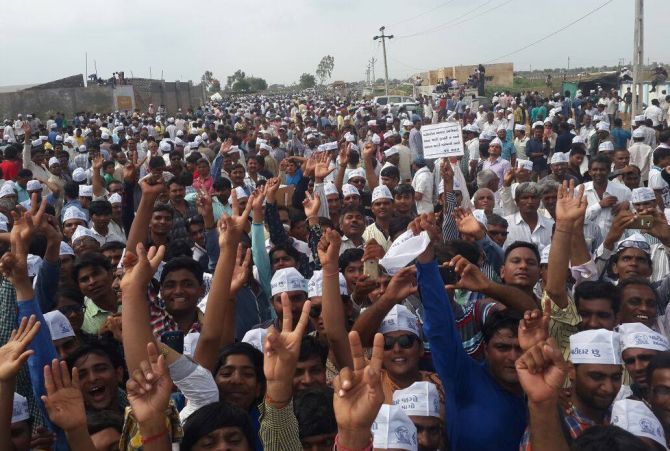The movement for reservations for Patels of Gujarat is full of contradictions and paradoxes, says Urvish Kothari.

Gujarat is witnessing reservations-related turmoil for the third time in recent history. The years 1981 and 1985 saw large-scale anti-reservations violence, with the Patels being at the forefront of opposing quotas at that time. Things have come full circle in 2015, with the Patels themselves demanding reservations as their right.
It is the largest mass mobilisation against the state government in a decade or so, though it can hardly be called a 'peoples' movement.' Different factions and sections of Patidars have united to demand a share in the OBC quota, which is 27% of the total seats in government jobs and college admissions. Hardik Patel, 22, of the Sardar Patel Group, is the face of the agitation.
Hardik Patel and many others who seek reservations for Patels are essentially seeking the abolition of caste-based reservations, just like the previous anti-reservations agitations. The only difference is that of articulation: If you don't abolish reservations, accord it to us.
With seven ministers in the state ministry and one-third of MLAs, against a population share of 12 per cent, the Patels are one of the most privileged communities politically as well as economically. The agitators boast that the government owes its existence to the Patels and they can very much 'crush the lotus' in the next election, 'just like they did with the Congress in 1985.'
It is noteworthy that their disproportionate political power has much to do with their association with the Bharatiya Janata Party and the politics of Hindutva. Banking solely on the 'P for Patel' card and nurturing hostility towards OBCs/Hindutva can substantially diminish their political clout.
The stock argument of Patels batting for reservations is economic deprivation and the issues of college admission for their youth. The notion of 'injustice' or 'unjust treatment' nursed by the Patels has nothing to do with their caste. All non-reserved castes can argue on the same lines.
What makes the Patels more aggrieved than others is perhaps the marginal erosion or stagnancy of their privileged position and clout. They blame reservations for other castes as the root cause of all their woes, which is far from reality.
Their agitation has nothing to do with the rationale of reservations, namely, equal opportunity, end of caste-based discrimination and social justice. Arguments for seeking reservations for self, or against reservations for 'the others' are not meant to gain social equality or respectable representation. It seeks to expand the net of privilege to not-so-well-off or poor Patels, leaving the remaining economically backward people aside.
In order to explain the 'pathetic condition' of Patels, some agitators as well as some academicians blame Narendra Modi's model of growth which claims 'sau no saath, sau no vikaas' but actually includes only a select few when it comes to real vikaas.
While the Gujarat model of development has been criticised for a long time and for valid reasons, the Patels are not finding fault in it the same way academicians do. The latter are concerned about the widening gap of inequality at large whereas the Patels, self-admittedly en bloc votaries of Modi, are more concerned about the weaker sections of their own community.
While it is true that not all Patels own a BMW or Audi and there are poor among the Patels, a larger understanding of 'injustice' or 'non-inclusion' can be derived only from proportional representation in which Patels fare much better than other castes.
Meritocracy is the favourite argument of anti-reservations campaigners. The Patels argue that their kids with higher percentage don't get admission to cheap government seats where as quota candidates with less marks snatch them away.
This argument ignores the stark reality of caste discrimination and the social stigma related with it. They don't realise the basic nature of the caste system which is inherently anti-merit as it decides merit from caste. Also, the worshipers of merit never mind a rich, non-Dalit student acquiring admission via the 'management quota.'
Admission woes and astronomical fees of higher education are issues directly connected to the mushrooming of self-financed colleges during the Modi regime in Gujarat. Targeting quotas instead of the state's education policy and its failures is like missing the point completely.
In the last few years, hundreds, and at time thousands, of engineering seats remain vacant in private colleges with high fees whereas government colleges don't have more seats to offer.
There are valid concerns and criticisms regarding the inclusion of some castes in the OBC list. Yet, most of the 'misuse' of quotas should lead to a debate over how to extend the benefits of reservations to the deserving castes/people within the OBCs. Because there are many castes in OBCs who don't get the intended benefits of quota due to the prevalence of affluent castes among them.
Adding castes like Patels into the OBC fold will add more woes to those already suffering inequality and lack of opportunities.
Just like Modi, the Patels didn't hesitate to appropriate Sardar Patel's image and chants of 'Jay Sardar.' A statue of the Sardar, a man who was never in the politics of caste, was installed on the stage at the Ahmedabad rally. Hardik Patel's speech was a leaf straight out of Modi's oratory book. He asked questions to the audience to get expected replies, and he spoke in Hindi.
The right-wing politics of the BJP and Modi had created a feeling of injustice and insecurity among the majority. It bore rich fruits for the BJP, but the present agitation is an offshoot of the same politics.
REDIFF RECOMMENDS











 © 2025
© 2025